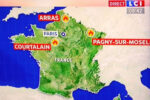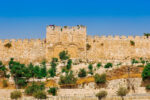Each week in synagogues, a parsha, or portion of the Torah is read in a cycle so that each year, in every synagogue, the whole Torah is read. Most of the parashot (plural) are named based upon an important word or event that takes place at the start of the parsha. These names and events help the reader to identify not only the location within the scroll but also its place in the timeline of the greater narrative of Israel.
For instance, the very first parsha is Bereshit (In the Beginning). Another parsha is named Chayei Sara (The Life of Sarah). This should help you understand that the naming of a parsha involves more than simply providing a means to identify chapter and verse. The naming of the parashot provided Israel with a means to recognize not just where they were in the scroll, but where Israel was in their journey.
While this mapping out of the journey through the naming of the parashot didn’t only provide a means for textual location, it also didn’t just provide a means to follow the physical journey of Israel through the wilderness. It helps us to understand the deeper and more important spiritual journey of Israel as they traveled to the Promised Land.
While you and I today are not walking physically along with the children of Israel from Egypt to the Promised Land, we are traveling along with them as we make our spiritual journey from Egypt (sin) to the Promised Land (the world to come).
In our walk as believers in Yeshua, every one of these parashot provides lessons and instructions that we can and should apply to our lives. Please understand that when I use the word instructions, I am not speaking solely of the commandments within the Torah, although they are very important. I am talking about the examples of successes and failures of those we read about in the Torah, and the blessings and discipline that follow their actions.
As you read a parsha, let me encourage you to remember three things. First, the main character of every parsha is G-D. Second, the narrative may not be focused on the people but rather the event. Third, no biblical event is disconnected from the greater narrative of the redemptive plan of G-D.
Let me provide an example to help you understand this concept. One of the parashot in the Book of Leviticus is Acharei Mot (After the Death). It begins with Leviticus 16:1-2 (TLV):
“Then ADONAI spoke to Moses after the death of the two sons of Aaron, when they approached the presence of ADONAI and died. ADONAI said to Moses, ‘Tell Aaron your brother not to come at just any time into the Holiest Place behind the curtain — before the atonement cover which is on the Ark — so that he would not die. For I will be appearing in the cloud over the atonement cover.'”
As we read these two verses, we see the names Moses and Aaron and the mention of Aaron’s two sons. However, none of these people is the focus of or the reason for the naming of this parsha. The focus of the parsha isn’t even the fact that Aaron’s sons had died.
No, the main character of the parsha, as with all parashot, is G-D and the event or thing we need to focus on to understand the greater narrative of redemption. As of this moment in time, Aaron is forbidden to enter the Holiest Place in the tabernacle “at just any time” now. Aaron and all priests that were to follow could only enter the Holiest Place when summoned by G-D, and they would know they were welcome to enter when they saw the cloud appear over the atonement cover.
The result of the sinful actions of Aaron’s two sons was this new separation between the priests and G-D. Just think for a moment how significant this punishment was. Up until this place in the story of Israel, Aaron could simply enter into the Holiest Place when he desired to be there. But now, not only has Aaron lost his two sons, he has also lost the blessing of entering into the Holiest Place when his heart desires to be in the special place of presence.
So, now we’ve established the main character is G-D and the main event is the removal of the ability of the priest to enter into the Holiest Place. But how does this parsha affect the greater narrative of redemption? In order to understand, we must look forward to Hebrews 10:19-21 (TLV):
“Therefore, brothers and sisters, we have boldness to enter into the Holies by the blood of Yeshua. He inaugurated a new and living way for us through the curtain — that is, His flesh. We also have a Kohen Gadol over God’s household.”
In Acharei Mot, we see in the redemptive narrative that due to the sin of Aaron’s sons, the priest and his children could no longer freely enter the Holiest Place at any time. In Hebrews 10, we find that because of the death of our High Priest, Yeshua, the priests can once again freely, or boldly, enter into the Holiest Place. This redemptive restoration of relationship applies to us today, according to 1 Peter 2:9 (TLV):
“But you are a chosen people, a royal priesthood, a holy nation, a people for God’s own possession, so that you may proclaim the praises of the One who called you out of darkness into His marvelous light.”
And Exodus 19:6 (TLV):
“‘So as for you, you will be to Me a kingdom of kohanim and a holy nation.’ These are the words which you are to speak to Bnei-Yisrael.”
We, as believers, are a royal priesthood, and although the death of Aaron’s sons caused the loss of the privilege to freely enter the Holiest Place, the end of the narrative of Acharei Mot isn’t seen until we read the Book of Hebrews. So, while Acharei Mot starts out with the heartbreaking death of Aaron’s sons, it ends with the wonderful restoration through G-D’s Son. {eoa}
Eric Tokajer is the author of Overcoming Fearlessness, What If Everything You Were Taught About the Ten Commandments Was Wrong?, With Me in Paradise, Transient Singularity, OY! How Did I Get Here?: Thirty-One Things I Wish Someone Had Told Me Before Entering Ministry, #ManWisdom: With Eric Tokajer, Jesus Is to Christianity as Pasta Is to Italians and Galatians in Context.
Read articles like this one and other Spirit-led content in our new platform, CHARISMA PLUS.






Leave a Comment
You must be logged in to post a comment.